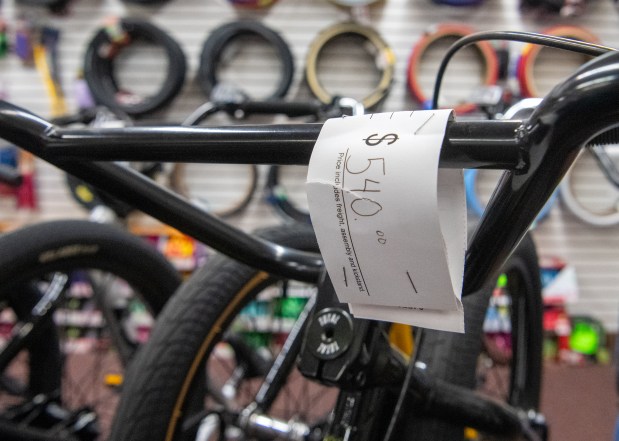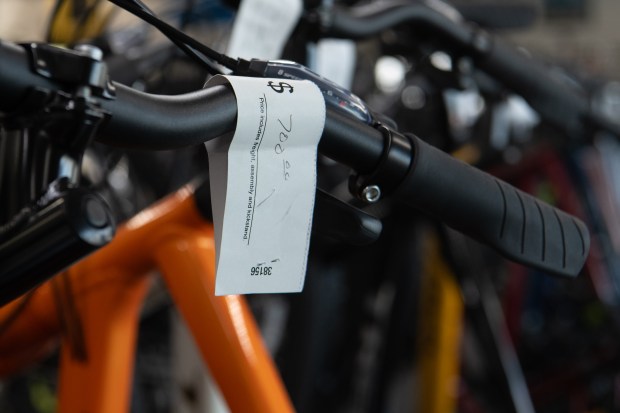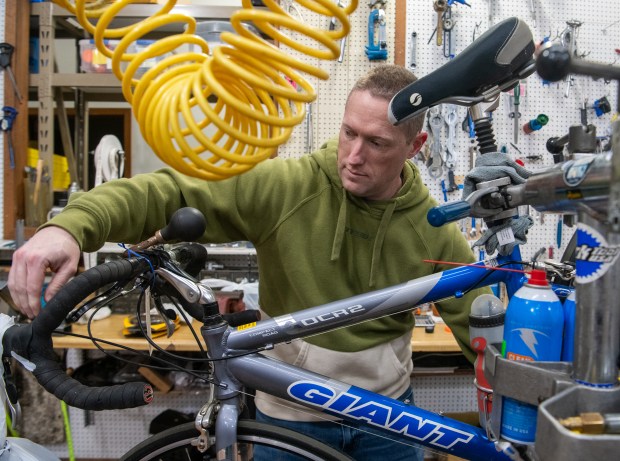Roger Walsworth is riding out the latest tariff talks with China officials led by U.S. President Donald Trump.
Walsworth, the owner of Buck’s Bicycle Shop in Valparaiso, has been selling bikes for 53 years in Valparaiso.
He’s well aware of the latest tariff discussions and about the proposed hefty hikes which could affect his business since a great number of bikes he sells originate from China.
“The whole tariff thing is up in the air. We’ve had price increases but not because of the tariff. It’s because of the cost of other stuff including the usual business expenses such as trash removal,” Walsworth said.
The cost of transporting the bikes to his store is what has hit his business the hardest, he said.
“Freight has skyrocketed, so we pass the cost along,” he said.
Walsworth said he is confident, given his current supply of bikes in house, that he won’t have to increase prices, due to the tariffs — at least for right now.
“Even if the tariff kicks in I should be good for this year,” he said.
China announced Friday it will raise tariffs on U.S. goods from 84% to 125% — the latest salvo in an escalating trade war between the world’s two largest economies that has rattled markets and raised fears of a global slowdown, according to the Associated Press.
While Trump paused import taxes on Wednesday for other countries, he raised tariffs on China and they now total 145%. China has denounced the policy as “economic bullying” and promised countermeasures.
The new tariffs began Saturday.

Buck’s Bicycle Shop manager Shaun Zimmerman agrees with Walsworth that it is hard to predict right now how the outcome of the tariff talks will affect the price of bikes.
“This is all too quick. We haven’t seen anything yet as far as increases, but we have been warned,” Zimmerman said.
Bike shops, like the one in Valparaiso, have been notified by manufacturers that the price could increase by as much as 10%, he said.
“It’s still too early,” he added.

Zimmerman said a lot of bikes sold through Buck’s do originate in China or Taiwan.
“They used to be made in China then branched out to Taiwan,” he said.
Previously, through most of the 20th Century, there were numerous bike manufacturers in the United States including the Schwinn Bicycle Company, founded in 1895 by Ignaz Schwinn.
Schwinn, which became the dominant manufacturer of American bicycles, declared bankruptcy in 2002 and was purchased by Pacific Cycle, now owned by Dutch conglomerate Pon Holdings, according to Wikipedia.
Buck’s Bicycle Shop does do bike repairs but Zimmerman said he hasn’t noticed any big increase in that part of the business as of right now.
Repairs to old bikes became more common during COVID when Buck’s was selling 300-400 bikes a month and the store was running out of inventory due to bike factories in China closing down for several months.
“We haven’t seen a lot of pickup in our repair area since COVID,” he said.

Mitch Barloga, the active transportation planner for the Northwestern Indiana Regional Planning Commission, well remembers the huge increase in the number of bike riders during COVID when there was a 108% increase in trail ride usage from March 2019 to March 2020.
Barloga said he is watching with interest the current tariff talks and what this will mean for the entire economic picture, not just the impact on the cost of bikes.
“Obviously all the supply chains are in flux, not just bikes,” Barloga said.
He is hoping for more stability in regard to the future economy in the United States.
“We just hope all goes well for them in these turbulent times,” he said.
Jeff Herak, who owns Ridge Cyclery in Highland, said the situation bike shops are in started during the pandemic. People bought every single bike he had in stock, which was great, but then the supply chain broke, and he and many other bike shops couldn’t get the inventory they needed to replace what had been sold.
That still hasn’t changed much, in part because shops can’t order just a few bikes at a time anymore, and he isn’t a corporate store for one brand.
“I can tell you there’s no inventory; it’s all in containers right now,” he said. “Overseas bike manufacturers produce several brands of bikes, but often use one body type and slap on the different name stickers. So, if there aren’t pre-orders on a large scale, they’re not going to sell them. And that’s not just for small shops; it happens at Walmart, too, but it’s seasonal for them.”
Herak’s in a better spot than others because his shop focuses more on repairs, but that’s not been easy, either.
“I’ve never seen inventory so low for parts — rubber and anything small,” he said. “Take a bike wheel: The wheel is the most expensive part of a bike, starting at $60 and going up to $110. Well, a kid’s bike costs $150, so are you going to pay for a part that costs as much as the bike? (Bike manufacturers are) doing what car manufacturers are doing and making it so parts have to be purchased in units, or they’re making their parts special sizes that can’t can’t easily be replaced.
“If it goes full tariff, you’ll lose 50% of small bike shops.”
Deborah Laverty and Michelle L. Quinn are freelance reporters for the Post-Tribune.




